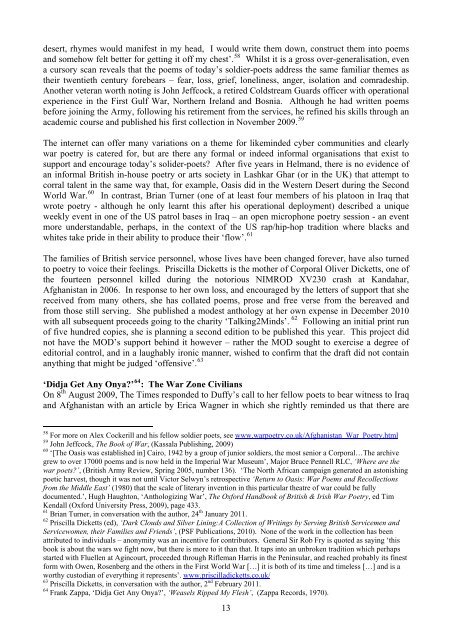Where are the war poets? - Defence Academy of the United Kingdom
Where are the war poets? - Defence Academy of the United Kingdom
Where are the war poets? - Defence Academy of the United Kingdom
You also want an ePaper? Increase the reach of your titles
YUMPU automatically turns print PDFs into web optimized ePapers that Google loves.
desert, rhymes would manifest in my head, I would write <strong>the</strong>m down, construct <strong>the</strong>m into poems<br />
and somehow felt better for getting it <strong>of</strong>f my chest’. 58 Whilst it is a gross over-generalisation, even<br />
a cursory scan reveals that <strong>the</strong> poems <strong>of</strong> today’s soldier-<strong>poets</strong> address <strong>the</strong> same familiar <strong>the</strong>mes as<br />
<strong>the</strong>ir twentieth century forebears – fear, loss, grief, loneliness, anger, isolation and comradeship.<br />
Ano<strong>the</strong>r veteran worth noting is John Jeffcock, a retired Coldstream Guards <strong>of</strong>ficer with operational<br />
experience in <strong>the</strong> First Gulf War, Nor<strong>the</strong>rn Ireland and Bosnia. Although he had written poems<br />
before joining <strong>the</strong> Army, following his retirement from <strong>the</strong> services, he refined his skills through an<br />
academic course and published his first collection in November 2009. 59<br />
The internet can <strong>of</strong>fer many variations on a <strong>the</strong>me for likeminded cyber communities and clearly<br />
<strong>war</strong> poetry is catered for, but <strong>are</strong> <strong>the</strong>re any formal or indeed informal organisations that exist to<br />
support and encourage today’s solider-<strong>poets</strong> After five years in Helmand, <strong>the</strong>re is no evidence <strong>of</strong><br />
an informal British in-house poetry or arts society in Lashkar Ghar (or in <strong>the</strong> UK) that attempt to<br />
corral talent in <strong>the</strong> same way that, for example, Oasis did in <strong>the</strong> Western Desert during <strong>the</strong> Second<br />
World War. 60 In contrast, Brian Turner (one <strong>of</strong> at least four members <strong>of</strong> his platoon in Iraq that<br />
wrote poetry - although he only learnt this after his operational deployment) described a unique<br />
weekly event in one <strong>of</strong> <strong>the</strong> US patrol bases in Iraq – an open microphone poetry session - an event<br />
more understandable, perhaps, in <strong>the</strong> context <strong>of</strong> <strong>the</strong> US rap/hip-hop tradition where blacks and<br />
whites take pride in <strong>the</strong>ir ability to produce <strong>the</strong>ir ‘flow’. 61<br />
The families <strong>of</strong> British service personnel, whose lives have been changed forever, have also turned<br />
to poetry to voice <strong>the</strong>ir feelings. Priscilla Dicketts is <strong>the</strong> mo<strong>the</strong>r <strong>of</strong> Corporal Oliver Dicketts, one <strong>of</strong><br />
<strong>the</strong> fourteen personnel killed during <strong>the</strong> notorious NIMROD XV230 crash at Kandahar,<br />
Afghanistan in 2006. In response to her own loss, and encouraged by <strong>the</strong> letters <strong>of</strong> support that she<br />
received from many o<strong>the</strong>rs, she has collated poems, prose and free verse from <strong>the</strong> bereaved and<br />
from those still serving. She published a modest anthology at her own expense in December 2010<br />
with all subsequent proceeds going to <strong>the</strong> charity ‘Talking2Minds’. 62 Following an initial print run<br />
<strong>of</strong> five hundred copies, she is planning a second edition to be published this year. This project did<br />
not have <strong>the</strong> MOD’s support behind it however – ra<strong>the</strong>r <strong>the</strong> MOD sought to exercise a degree <strong>of</strong><br />
editorial control, and in a laughably ironic manner, wished to confirm that <strong>the</strong> draft did not contain<br />
anything that might be judged ‘<strong>of</strong>fensive’. 63<br />
‘Didja Get Any Onya’ 64 : The War Zone Civilians<br />
On 8 th August 2009, The Times responded to Duffy’s call to her fellow <strong>poets</strong> to bear witness to Iraq<br />
and Afghanistan with an article by Erica Wagner in which she rightly reminded us that <strong>the</strong>re <strong>are</strong><br />
58 For more on Alex Cockerill and his fellow soldier <strong>poets</strong>, see www.<strong>war</strong>poetry.co.uk/Afghanistan_War_Poetry.html<br />
59 John Jeffcock, The Book <strong>of</strong> War, (Kassala Publishing, 2009)<br />
60 ‘[The Oasis was established in] Cairo, 1942 by a group <strong>of</strong> junior soldiers, <strong>the</strong> most senior a Corporal…The archive<br />
grew to over 17000 poems and is now held in <strong>the</strong> Imperial War Museum’, Major Bruce Pennell RLC, ‘<strong>Where</strong> <strong>are</strong> <strong>the</strong><br />
<strong>war</strong> <strong>poets</strong>’, (British Army Review, Spring 2005, number 136). ‘The North African campaign generated an astonishing<br />
poetic harvest, though it was not until Victor Selwyn’s retrospective ‘Return to Oasis: War Poems and Recollections<br />
from <strong>the</strong> Middle East’ (1980) that <strong>the</strong> scale <strong>of</strong> literary invention in this particular <strong>the</strong>atre <strong>of</strong> <strong>war</strong> could be fully<br />
documented.’, Hugh Haughton, ‘Anthologizing War’, The Oxford Handbook <strong>of</strong> British & Irish War Poetry, ed Tim<br />
Kendall (Oxford University Press, 2009), page 433.<br />
61 Brian Turner, in conversation with <strong>the</strong> author, 24 th January 2011.<br />
62 Priscilla Dicketts (ed), ‘Dark Clouds and Silver Lining:A Collection <strong>of</strong> Writings by Serving British Servicemen and<br />
Servicewomen, <strong>the</strong>ir Families and Friends’, (PSF Publications, 2010). None <strong>of</strong> <strong>the</strong> work in <strong>the</strong> collection has been<br />
attributed to individuals – anonymity was an incentive for contributors. General Sir Rob Fry is quoted as saying ‘this<br />
book is about <strong>the</strong> <strong>war</strong>s we fight now, but <strong>the</strong>re is more to it than that. It taps into an unbroken tradition which perhaps<br />
started with Fluellen at Agincourt, proceeded through Rifleman Harris in <strong>the</strong> Peninsular, and reached probably its finest<br />
form with Owen, Rosenberg and <strong>the</strong> o<strong>the</strong>rs in <strong>the</strong> First World War […] it is both <strong>of</strong> its time and timeless […] and is a<br />
worthy custodian <strong>of</strong> everything it represents’. www.priscilladicketts.co.uk/<br />
63 Priscilla Dicketts, in conversation with <strong>the</strong> author, 2 nd February 2011.<br />
64 Frank Zappa, ‘Didja Get Any Onya’, ‘Weasels Ripped My Flesh’, (Zappa Records, 1970).<br />
13

















